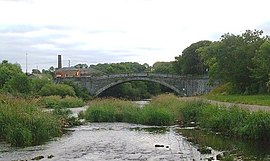Lucan Bridge
Lucan Bridge Droichead Leamhcáin | |
|---|---|
 River Liffey and Lucan Bridge | |
| Coordinates | 53°21′36″N 6°26′46″W / 53.359959°N 6.446207°W |
| Crosses | River Liffey |
| Locale | County Dublin |
| Characteristics | |
| Design | Arch bridge |
| Material | Ashlar masonry |
| Total length | 33m |
| No. of spans | 1 |
| History | |
| Designer | George Knowles |
| Construction end | 1814 |
| Location | |
 | |
Lucan Bridge (Irish: Droichead Leamhcáin)[1] is a road bridge spanning the River Liffey in Lucan, County Dublin, Ireland. It joins Lucan's Main Street to the Lower Lucan Road, carrying traffic towards Clonsilla and the north, and the Strawberry Beds to the east. Designed by George Knowles (architect of Dublin's Fr. Mathew and O'Donovan Rossa Bridges), it was built in 1814. Constructed in collaboration with James Savage at a cost of more than £9,000,[2] it replaced several previous bridges which had been carried away by floods.[3]
The bridge is the largest single span masonry arch bridge in Ireland,[3] and is constructed from ashlar masonry with a span of 33 metres (110 feet) and a rise of 6.7 metres (22 feet). It is framed by iron balustraded parapets made by the Royal Phoenix ironworks of Parkgate Street in Dublin.[4]
Design and construction
The first bridge built on this spot was a stone bridge laid down in the later years of the reign of King John (c. 1200). A subsequent bridge was built by the first Agmondisham Vesey c. 1730, but washed away within very short time. The next was built c. 1771, but this too washed away in a flood in 1786 – as did its replacement.[5]
The design of the bridge was inspired by Island Bridge, aka Sarah Bridge, near Kilmainham which was completed in 1793.[2] The walls are made of squared limestone, with the slender, ashlar voussoirs drawing the curve of the arch below.[2] Whilst the geology of the river banks could have befitted a shorter bridge, Knowles was suspected of purposefully elongating the bridge to 110 ft to give it the honour of being the longest single span bridge in Ireland, a record it still holds.[2]
In 1814, the present single-span bridge was completed by Savage & Knowles, and has remained largely unaffected by the effects of flooding common to this stretch of the Liffey. The bridge appears today largely in the same way as early 19th century visitors would have seen it.[2] The bridge, however, has seen some recent developments, with the raising of the roadway near both ends of the arch to lessen the gradient for road traffic.[4] Repairs were carried out in 2011 whereby lost capping was replaced, stonework was repointed and the balustrades were given a fresh coat of paint.[2]
In 2021 it was featured in the RTÉ One series Droichid na hÉireann.[6]
References
- ^ "Droichead Leamhcáin/Lucan Bridge". Database of Placenames of Ireland. Department of Arts, Heritage, Regional, Rural and Gaeltacht Affairs. Retrieved 4 December 2016.
- ^ a b c d e f "LUCAN BRIDGE / DROICHEAD LEAMHCÁIN". bridgesofdublin.ie. Retrieved 19 June 2022.
- ^ a b Cox, Ronald C (1998). Civil Engineering Heritage, Ireland. Thomas Telford. ISBN 0-7277-2627-7.
- ^ a b "The Liffey at Lucan". Gerry O'Flynn. 6 May 2000.
- ^ "Lucan Bridge – History". Bridges of Dublin. Dublin City Council. Retrieved 4 December 2016.
- ^ "Droichid na hÉireann". RTÉ Player. Retrieved 11 January 2022.
{{cite web}}: CS1 maint: url-status (link)
